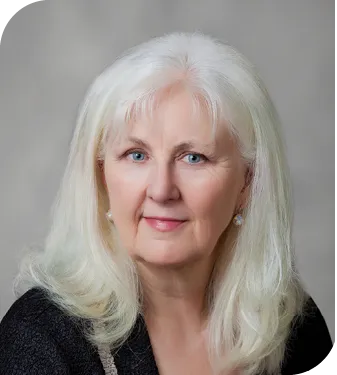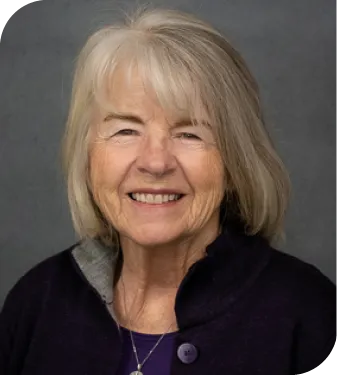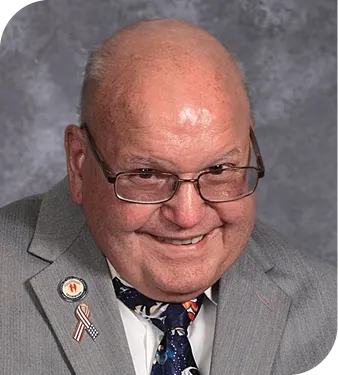ith public education experiencing upheaval and disarray, having someone at the helm with experience navigating troubled waters can become a lifeline for students, staff and communities who rely on schools to be a place of stability.

istrict and county office of education governance teams have seen higher turnover rates in recent years with many trustees retiring, opting not to run for re-election or losing elections to new candidates, throughout the state. However, trustees boasting 20, 30 and even 40 years of experience continue to provide local educational agencies with wisdom that can be key in challenging times.
“There is a lot of value in historic knowledge and longevity on a board, even if it’s just helping the new board members that come on learn their role and the importance of what they need to be doing at the table,” said Susan Markarian, former CSBA President and a Pacific Union Elementary School District trustee since 1985.
That experience isn’t just helpful for onboarding though, she explained during an interview in January as multiple wildfires were tearing through Los Angeles County. “It’s like these fires. Being able to call and talk to board members and administrators who have been through this and ask, ‘How do we get through this?’”
Markarian’s single-school, K-8 district in Central California has long served a rural, agricultural community. Prior to running for a school board seat, she understood the difficult situations facing students and educators because she grew up as the daughter of a local teacher, along with her experiences as a school site council chair and an active volunteer in classrooms at her children’s school.
While she was apprehensive to run for school board, she relented to pressure from staff and the community, and it paid off.
“I found that being a school board member became a real passion, and it felt like being involved in the community and the school and the education process in a way that made a difference. I could be a part of change,” Markarian said. “I saw firsthand how difficult it was to be a teacher and the struggles that went along with being a teacher. So, being a board member was also something that allowed me to be on the other side of ensuring that we could make things easier for our teachers.”
She has also taken the negative experiences she faced during her schooling — when higher education for women was not prioritized and access was limited due to a lack of proximity to colleges and universities — and worked to change things for today’s youth. “I always have had that desire to help and create access to education, to higher education for kids and better school experiences,” Markarian noted.
Her passion for improving public education and meeting the needs of local communities is shared by trustees up and down the state. In Northern California’s Trinity County Office of Education, which operates in a rural and mountainous community covering nearly 3,200 square miles, Sally Aldinger had served school districts on and off since the late ‘80s before being appointed to the Trinity COE board in 2019.




In Menefee Union School District, a preK-8 Southern California district experiencing significant growth, Robert “Bob” O’Donnell has served as a trustee since 1983. He has seen enrollment increase from about 300 students in one school to over 12,000 students now served in a preschool, 11 elementary schools, a K-8 STEAM academy, a virtual school serving grades 1-8 and four middle schools. The district office also grew, moving out of a portable and into a new, permanent building.
As former postmaster, O’Donnell always knew he wanted to remain involved once he retired. “I live in the community. My children were going to school in the community. I was the postmaster of the community. So, it kind of just fit that I’d be involved in some type of way. And so here 40 years later, I’m still on the school board,” he said.
In addition to being involved in the schools, O’Donnell volunteers at his local history museum, hospice, police department and hospital. “I have a motto,” he said. “I am living the dream and serving with purpose.”
Long-time trustees who stay engaged have the benefit of not only understanding their communities, but being trusted voices on behalf of public education locally.
“It’s all about building relationships in your community,” O’Donnell explained. “When you’re involved, people see that. So, I have opportunities to share with people what’s happening with our schools or what’s happening with our community.”
Sometimes those conversations revolve around what students are learning in the classroom, the budget, policies, school volunteer opportunities, the need for local facilities bonds and more.
“Being a board member opens up a lot of doors, and having a board that’s respected by the community — people are more apt to listen to a board member that appears to be having some bold, positive changes in the school district where they live,” O’Donnell said.
For Markarian, longevity in school governance has allowed her to witness firsthand the demographic changes in her community and how they impact local education.
She has seen the community become poorer as aging, middle-class farmers moved away, making way for seasonal workers from Mexico to put down roots and start families. “We have a farm worker community more than a farmer community now,” Markarian explained. Despite this shift, the number of English learners is decreasing as more children receive English instruction through early education programming.
However, some things have remained constant. “I understand the community and the difficulty of being more rural. Access to services is not here. Access to healthcare is not close. Meal services are not close,” she said. “The school is the center of the community, and we all understand that it’s a very different lifestyle than when you live in an urban area or even a suburban area.”
Aldinger also understands the plight of students having access to fewer necessary resources, which drives much of her work outside of Trinity COE. As treasurer of the Hayfork Scholarship Foundation, she helps to ensure local graduates have the funds to be able to pursue higher education. Through her work with the Trinity County Friends of The Library, she and her colleagues work to raise funds to keep local branches open so that children and communities have access to the numerous resources public libraries offer.
And with the Mountain Valley Youth Fund, Aldinger is among those helping families meet the basic needs of children that live within Mountain Valley USD boundaries. For example, if a student needs to get treatment at UC Davis Medical Center, the Mountain Valley Youth Fund can help with transportation costs and more.
This work “helps me see more of the big picture rather than be myopic,” Aldinger said. “I just feel like it’s good to know what’s going on in the community, who’s who, and how needs can best be met for students and their families.”
She credits staff with their dedication to delivering services despite challenges related to terrain, resources and sheer distance between school sites. “Because the schools are at the heart of our small communities, they are very often the center of community involvement,” Aldinger said. “The schools see that and are doing their best to accommodate and support our students.”
From furloughs during the Great Recession, to lower levels of family engagement as more parents join the workforce, to the increasing tension between local efforts to support students and a national political agenda seeping into communities, all three trustees shared a laundry list of the ways in which their district or county office has been tested during their time on the board.
One common thread: transportation. Facing cutbacks in state funding, Menifee Union SD was forced to do away with its busing in an effort to spare classrooms direct cuts. O’Donnell said the district is poised to start a pilot program early this year to provide busing to neighborhoods that are a bit further away from the elementary schools and middle school.
“Transportation has always been a very challenging issue,” Markarian said. “It takes a lot of money that we don’t necessarily get, and we bus close to 100 percent of our kids.” In Pacific Union Elementary SD, where an administrative secretary spent years as the substitute bus driver, four buses must take two trips each to pick up and drop off students.
Aldinger, whose county is highly dependent on forest reserve funds, has also seen staff rise to the occasion to meet the needs of students, but notes that little things are quick to add up.



“A part of a road went out and the county wasn’t able to fix it for over a year. And so, the bus had to go miles and miles around,” she continued. “The road has finally been fixed, but it’s just little things like that that causes other issues.”
Trustees also mentioned both pros and cons associated with the implementation of the Local Control Funding Formula (LCFF) — adopted by the state over 10 years ago to increase funding for high-need students (low income, English learner and foster youth) with a weighted formula. Along with that extra funding came increasing reporting demands, while declining enrollment, staffing challenges, shifts in special education and the expansion of early learning, before- and after-school programming challenged rural districts.
Being an involved and supportive trustee doesn’t require 40 years of experience, according to O’Donnell. Anyone can do it. When a new board member joins the team, O’Donnell said he schedules time to sit and talk about them, the history of Menifee Union, what the district has been working on, and gives them a pamphlet of acronyms as well as an overview of what a trustee does.
He also attends “all the oversight committee meetings because it helps me to be informed of some of the things that are going on,” he said. Going to Community Planning Advisory Council meetings on special education has proven especially helpful in understanding the ‘why’ behind litigation and other issues he’d see at board meetings.
“It’s helped me tremendously. And I’ve seen settlements actually slow down, and I think it’s because they see someone from the board is willing to sit at these committee meetings and meet with the parents and speak with them,” O’Donnell said. “I’ve been able to be so involved because I’m retired, but all these meetings are done in the evening. So, I think that’s another thing that if you are going to be a board member, you’ve got to give up some of your time to do the job. It’s not just coming to a board meeting once a month or twice a month or coming when everything is being celebrated. You want to be out there when things are tough.”
Taking the time to visit schools and meet with everyone from custodians to nutrition staff to teachers is also important in ensuring everyone feels valued, he said.
Markarian, who was sent by her school board president and mentor for training when she first entered the world of governance, emphasized the importance of listening early on, and establishing a strong foundation and better understanding of the role of a trustee.



“My advice to new trustees is to get yourself trained. You get yourself to CSBA and get yourself trained, get into new board member training, and then take Masters in Governance® and listen and learn,” she said. “Being involved with CSBA has made it easy to stay current and engaged. If you’re reading those emails, the magazines, the weekly updates, the monthly newsletter — it’s all there. Keep yourself informed and engaged on what’s going on in your district and go to the Annual Education Conference, there’s always so much there that’s new and innovative. It’s really all provided if you’re willing to take advantage of it.”
Staying up to date is critical for the work of trustees. “I like to keep abreast of what’s going on in education and in our county and country,” Aldinger said. “I try to stay up on current events, but in terms of the board stuff, I read everything, and not just the board packet — I look up background information, I look up Ed Code. I just try to do my research so when I walk into a board meeting, I have the information that I need, and I might need it to share with some of the other board members.”
“Being involved with CSBA has made it easy to stay current and engaged. If you’re reading those emails, the magazines, the weekly updates, the monthly newsletter — it’s all there.”
Despite their extensive experience, each trustee noted the importance of remaining flexible in their thinking. “I’ve learned that change is around us all the time. And you got to be able to look at things in a new way,” O’Donnell said. Whether it’s piloting programs, seeking input from staff who do the work day-to-day or ensuring every voice is heard on critical issues, it’s important that trustees remember to be available and willing to make changes, he said.
Education governance can be a thankless role at times, so it’s crucial to find the thing that keeps one going. “It’s the joy I get out of meeting with people, going out and giving back. That’s why I do it, and I’ll stay involved until the day I leave this earth,” O’Donnell said.
“I still really enjoy being a board member,” Markarian echoed. “It’s just rewarding work. I still feel like I can make a difference, and I bring historic knowledge and that voice of the small, rural school that still needs to be considered.”
Aldinger, in providing words to the wise, noted that being a great trustee means you “represent everyone and focus on the real work — how to get positive outcomes for the students.”